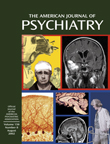Dr. Gitlin and Colleagues Reply
To the Editor: We appreciate Dr. Zipursky’s comments about our recent article. He asks a key question: given the high rate of return of psychotic symptoms in our group of recent-onset schizophrenia patients during a trial period without maintenance medication, why not simply recommend continuous treatment, even after 1–2 years of maintenance medication, while acknowledging that some (or many) patients will not follow that advice? Avoiding even nonhospitalized recurrence of psychosis is an important goal that we did not mean to minimize in the discussion of our results. Our data suggest that the exacerbation or relapse rate is high (78% within 1 year and 96% within 2 years) for carefully diagnosed patients, even after an initial period of maintenance medication.
We certainly hope that the findings of this study will be shared with first-episode patients who are weighing the costs and benefits of long-term continuous medication therapy. All decisions in medicine are, of course, made by using risk-benefit comparisons. Our study was conducted before atypical antipsychotics were available for everyday clinical treatment of recent-onset patients, so the risk of tardive dyskinesia was a dominant component of any discussion of long-term treatment. As the risks (e.g., chances of severe side effects) of antipsychotic medications decrease with advances in the formulation of atypical antipsychotics, the scales tip in favor of advocating longer periods of continuous medication treatment after an initial episode.
Despite important psychopharmacological advances, atypical antipsychotic agents are unfortunately not risk free. Various medical concerns—especially those related to alterations in lipid profiles and new-onset diabetes mellitus—and subjectively distressing side effects, such as sedation, weight gain, and sexual dysfunction, make a decision to undertake long-term treatment after a first episode worthy of discussion rather than an automatic recommendation. Indeed, weighing the benefits and risks of a specific treatment is part of the right of choice that patients have and reinforces the trust relationship so critical to open, honest communication between doctor and patient. Therefore, we did not make a universal recommendation for patients with recent-onset schizophrenia.
We also know that approximately one-half of all schizophrenia outpatients will be significantly noncompliant with their antipsychotic medication over a 1-year period. Rather than having patients resort to the overt (or covert) nonadherence to prescribed medication that typically results in their dropping out of treatment altogether, we would rather see the patient and psychiatrist agree to try a period without medication with close clinical monitoring if patients do not accept the recommendation of long-term continuous medication.
We agree with Dr. Zipursky that a finer-grained analysis of the functional consequences of a return of psychotic symptoms would be illuminating, particularly if this could be done within a randomized study design that would allow firmer conclusions to be made. Since neurocognitive impairment is more strongly and consistently related to functional impairment than positive symptoms (1), such studies should include consideration of any changes in neurocognitive impairment over time.
As new antipsychotics are developed with greater efficacy on multiple dimensions of schizophrenic psychopathology (including negative symptoms) and more benign side effect profiles, recommendations for continuous long-term treatment after a first schizophrenic episode for all patients may become the norm. For now, however, we believe that case-by-case clinical consideration, within the context of a truly collaborative patient-doctor relationship, is optimal.
1. Green MF: What are the functional consequences of neurocognitive deficits in schizophrenia? Am J Psychiatry 1996; 153:321-330Link, Google Scholar



